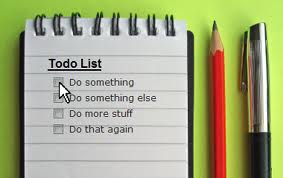Career
Work Smart with Effective ‘To-Do’ Lists
 Productivity is always an issue with managers, workers and even the self employed. I used to have issues with productivity; tons of articles left half written, client emails to respond to, proposals to complete and so on. For years I struggled with putting up the best possible work I could each day without postponing important tasks and missing schedules. I started using to-do lists a few years ago and still didn’t notice much improvement on my productivity issues. That was until a senior colleague let me into his secrets of working well with to-do lists. I got better with creating and using to-do lists effectively as I obviously got more work done.
Productivity is always an issue with managers, workers and even the self employed. I used to have issues with productivity; tons of articles left half written, client emails to respond to, proposals to complete and so on. For years I struggled with putting up the best possible work I could each day without postponing important tasks and missing schedules. I started using to-do lists a few years ago and still didn’t notice much improvement on my productivity issues. That was until a senior colleague let me into his secrets of working well with to-do lists. I got better with creating and using to-do lists effectively as I obviously got more work done.
This article is not a broad advice on how to be more productive. It is more on practical tips to using a to-do list to effectively increase your productivity levels.
Creating to-do lists help you work better and more efficiently.
To-do lists are very effective when they’re kept simple and straight forward. Start by drawing a line down the middle of a page in your daily planner. Mark the column on the left, “Daily Tasks” and the column on the right, “Tasks that can be delegated successfully“
Start from the most urgent and important tasks and list your day’s expected work and work your way down the list. That way, you start working immediately on the more urgent and important things and gradually move down to less important duties.
It is counter-productive to have too many things on your to-do list as there are only so many work hours in a day. In my experience, when I have too many things scheduled within a limited time frame, I end up achieving less than I could have. Most times, I had lots of uncompleted tasks as I had to interrupt a task because the time for it was up and take up another. It is better you have three major tasks to accomplish and meet up with all of them than attempting to do seven things and end up not finishing one.
While creating your to-do list it is important to remember that there will be distractions during the course of the day. Your boss or colleague might have urgent stuff for you to help out with, this will ultimately disrupt your planned schedule. So, while putting down your day’s schedule, try to keep it flexible to make provision for miscellaneous duties or emergencies.
Remember the right column in your planner? You’ve listed the tasks to be delegated successfully so you can now pick up the phone or log onto your email account and start delegating them right away. Delegation is an excellent way to achieve more in the limited 24-hour day. If you can quickly delegate all the tasks on the right hand column of list it will help you fully concentrate on executing those duties that remain for you to handle.
When to write your To-Do list
Writing your day’s to-do list when you arrive in the morning at your work desk is not the best way to start the day on a great footing. Your to-do list should be created preferably at night before you go to bed. It should take about 15 minutes or less. You think through the next day’s work schedule and write out your list. Early the next morning is a good time to look through your list and make any slight adjustments that need to be made.
Tips for working with effective To Do Lists
– Attach acronyms to indicate urgency and importance levels to each task. You can develop your own unique acronyms to indicate levels of importance.
– Review your to-do list for each day at the end of work and note uncompleted tasks that may need to be moved over to the next day. Reviewing each day’s list will help you understand your challenges in execution and improve on your levels of completing subsequent lists.
– The to-do list is a means not an end. If your typical day is anything close to mine, your list will only reflect 50% of how your day went as unplanned but still important issues may come up demanding your attention. Regard your list as a flexible map to help you streamline and tackle the tasks that you are already aware of; and be prepared to use your sense of judgment in foregoing less important parts of your list to do some other urgent responsibilities that will surely crop up in your day.
Remember a to-do list is meant to be executed hence the name “TO-DO”. It is not a story idea draft that you lock away in your drawer. If you create your to-do lists with your smart phone (like I do), you can easily check through during the day and stay on track. Otherwise your to-do list should be on a portable daily planner that you can carry with you and glance through periodically.
Follow these tips, commit to executing as much as possible the tasks on your list and watch your productivity grow.
___________________________________________________________________________________________________
Paul Eze is the Co-Founder and Vice President of Ngcareers a top job search and employment website in Nigeria that enables jobseekers search latest job openings from thousands of employers and recruiters. Follow him on Twitter via @paulemekaeze
























